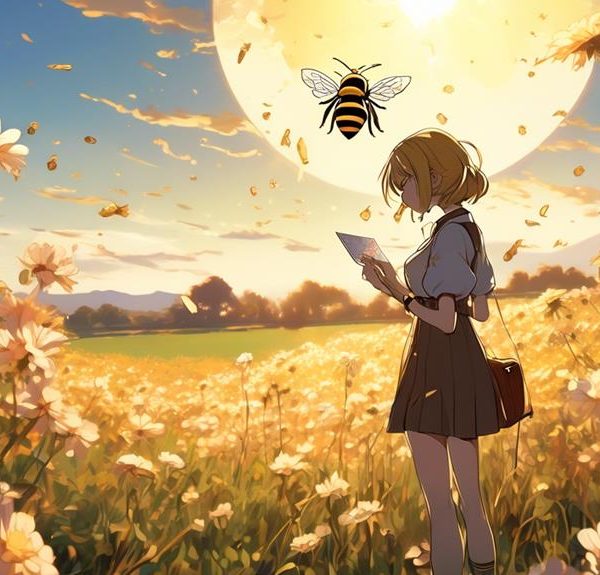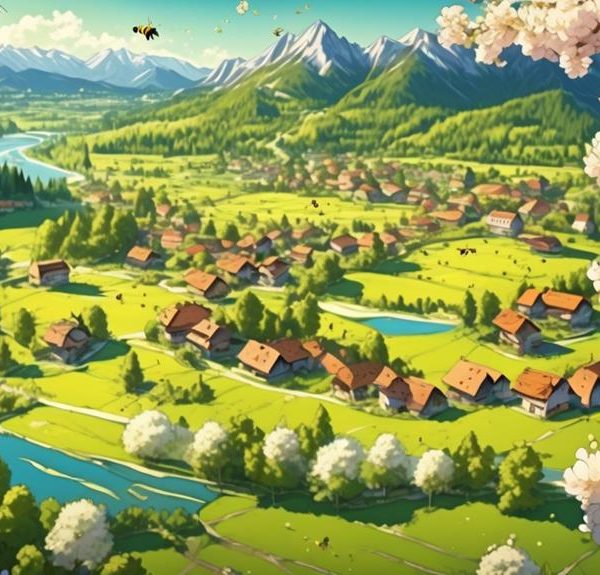Curious about bees' dietary habits and their relationship with apples? Dive into this enlightening exploration packed with intriguing insights.
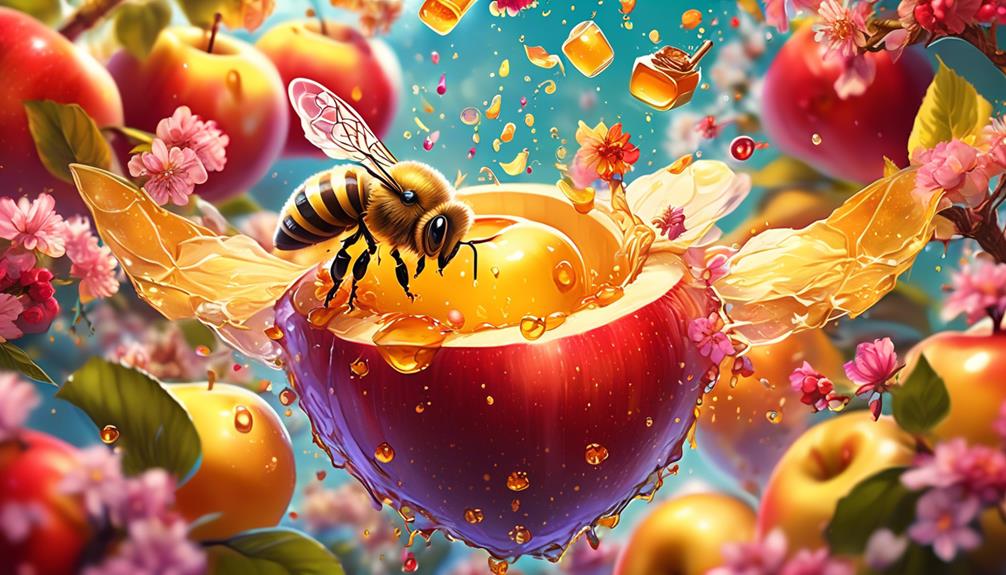
Can Bees Eat Apple?
As the saying goes, 'An apple a day keeps the doctor away,' but can the same be said about bees and apples? You might be aware that bees play an indispensable role in pollinating apple trees, but do they also consume parts of this fruit?
Let's explore the dietary habits of bees, their relationship with apples, and how it shapes our understanding of these industrious creatures. Hold onto your hats, as this is bound to unravel fascinating insights about the little buzzers we often take for granted.
Key Takeaways
- Bees can consume apple juice, but they cannot digest apple flesh fully.
- Apples provide bees with sugar, mimicking their energy source from nectar.
- Bees play a crucial role in cross-pollinating apple flowers, facilitating fruit production.
- Pesticides and fungicides used in apple farming are toxic to bees and can harm their health.
Understanding Bee's Dietary Habits
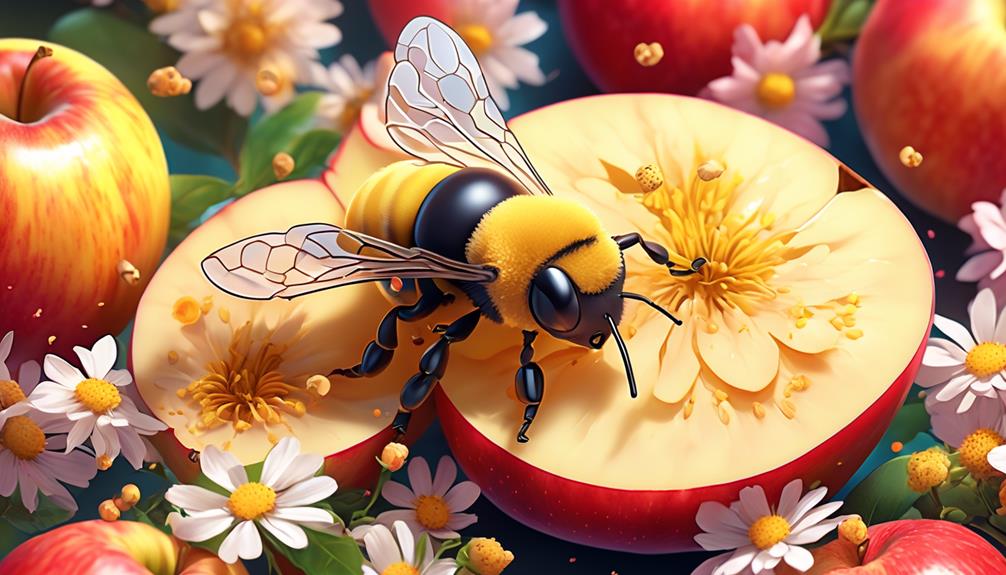
To comprehend a bee's dietary patterns, it's crucial to delve into their natural feeding habits and understand what they typically consume. Bees, as you might know, primarily feed on nectar and pollen. Nectar, a sugary liquid, serves as an energy source, while pollen provides proteins and fats.
In the pursuit of these nutrients, bees visit a vast array of flowers, each offering a unique blend of sugars in their nectar and a distinct set of nutrients in their pollen. So, you see, bees' diets aren't just sugar-based; they're quite complex, varied, and highly dependent on the plant species they visit.
However, what happens when bees encounter something outside of their usual diet, like apple slices? Can they consume it safely? Well, it's not a simple yes or no answer. Bees can ingest the juice from apples as it's similar to nectar. However, consuming the flesh of the apple isn't usually a part of their diet, and they may not be equipped to digest it fully.
Understanding dietary habits of bees is instrumental to effectively answer these questions.
The Role of Apples in Bee Nutrition
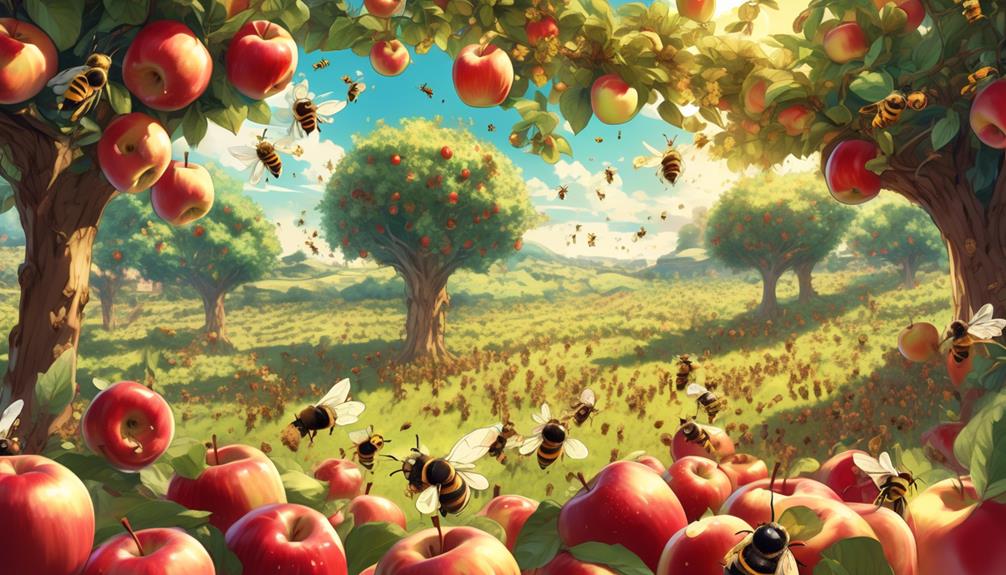
Diving into the role of apples in bee nutrition, it becomes apparent that while bees can't consume apple flesh, the juice of the apple provides them with sugar, mimicking the energy source they typically obtain from nectar. This sugar is a key energy source and is crucial for their survival, especially during colder seasons when flowers are scarce.
You might be curious about how bees extract this juice. It happens when apples are overripe or when other insects or animals have already broken the apple's skin. Bees are opportunistic feeders and they'll take advantage of this readily available food source.
The nutrients from apple juice also play a part in bee health. Apples contain trace amounts of vitamins and minerals that, while not a bee's primary nutritional source, contribute to their overall well-being. However, it's important to understand that apples can't replace flowers entirely in a bee's diet. The pollen from flowers is a vital protein source for bees, making it an indispensable part of their diet.
Impact of Bees on Apple Pollination
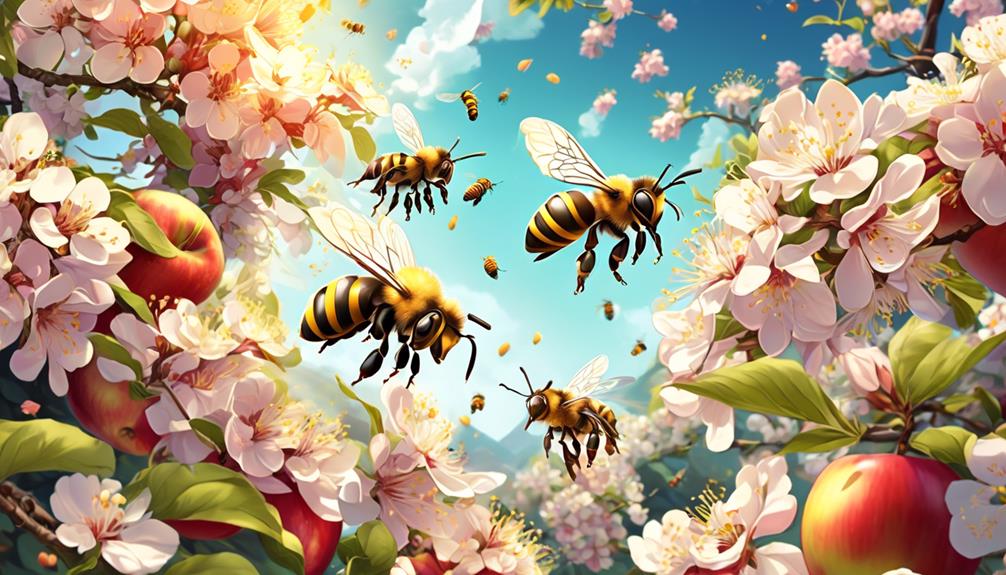
While the juice of apples plays a pivotal role in supplementing the diet of bees, it's also essential to consider the reciprocal benefits bees provide, particularly their impact on apple pollination. You see, apples rely heavily on cross-pollination, a process where pollen is transferred from one apple flower to another, to produce fruit. This is where bees come in.
As bees move from flower to flower, they pick up pollen on their bodies. When they visit the next flower, some of this pollen rubs off, facilitating pollination. Studies show that bees are responsible for about 80% of apple pollination. Without them, apple yields could drop dramatically.
Moreover, bees don't just impact the quantity of apples produced; they also influence the quality. Apples that have been properly pollinated are generally larger, better shaped, and have a longer shelf life.
The Symbiotic Relationship Between Bees and Apples
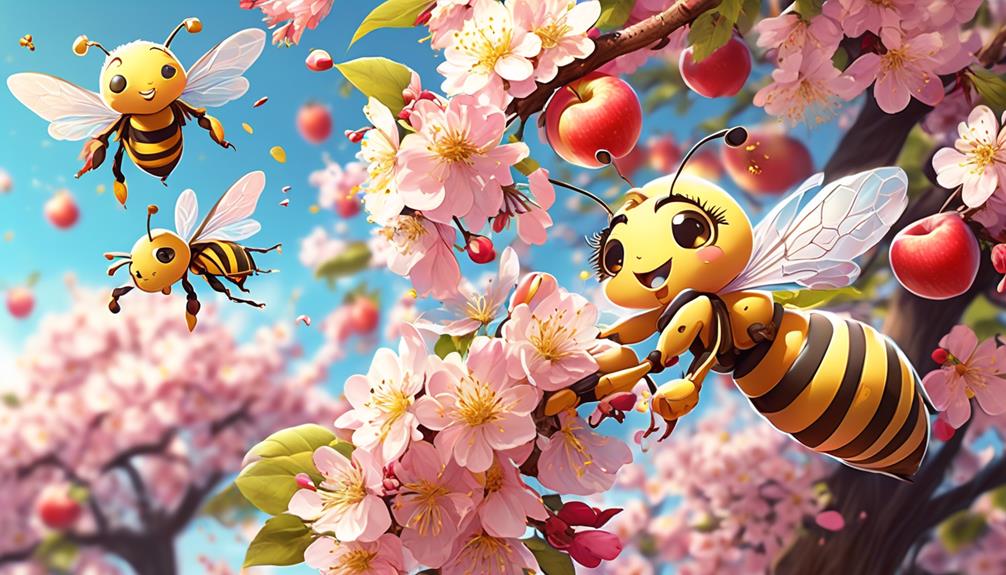
Building upon their integral role in apple pollination, bees and apple trees share a mutually beneficial, symbiotic relationship that's crucial for both their survival and the overall ecosystem. In fact, without this relationship, you'd witness a dramatic decline in apple yields and bee populations alike.
As you might know, bees require nectar and pollen, two substances they get from flowering plants like apple trees. In their quest for these nutrients, bees inadvertently transfer pollen from the male parts of a flower to the female parts, enabling fertilization and fruit production. This process, known as pollination, is what apple trees need to bear fruit.
Conversely, apple trees offer a rich source of nectar and pollen that bees require for nourishment and hive-building. They're like a one-stop shop for bees, providing them with the food they need to survive and reproduce.
Threats to Bees in Apple Orchards
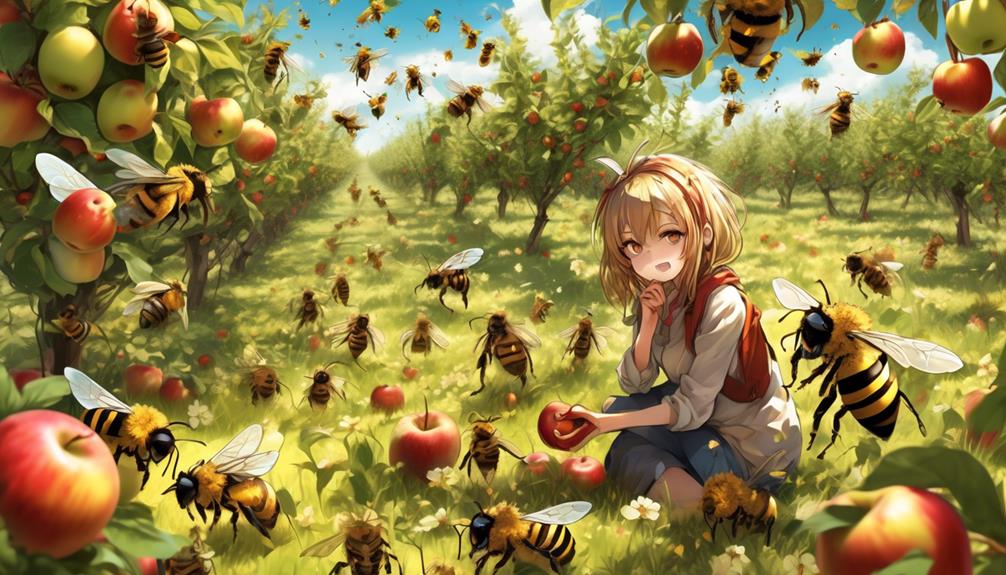
Despite the mutual benefits bees and apple trees share, it's important to note that apple orchards can also pose significant threats to these vital pollinators. The widespread use of pesticides and fungicides in apple farming is a major concern. These chemicals, especially neonicotinoids, are highly toxic to bees, causing both immediate death and long-term harm like impaired navigation and reduced fertility.
You must also consider the threat of habitat loss. Bees need diverse flora for optimal health, but intensively managed orchards often lack this. Without a variety of flowers for nectar and pollen, bees' diet becomes unbalanced, weakening their immunity against diseases and parasites.
Speaking of diseases, the Varroa mite is a significant pest in many orchards. This parasite weakens bees and spreads deadly viruses. Furthermore, climate change is exacerbating these threats, with fluctuating temperatures causing mismatches between bee activity and flowering times.
As a stakeholder, whether you're an apple grower, beekeeper, or consumer, you should appreciate the complexity of this issue. It requires balancing the need for pest control and high yields with the ecological necessity of bee health. It's a delicate balance, but understanding these threats is the first step to ensuring the survival of our essential pollinators.
Ways to Promote Bee Health in Orchards
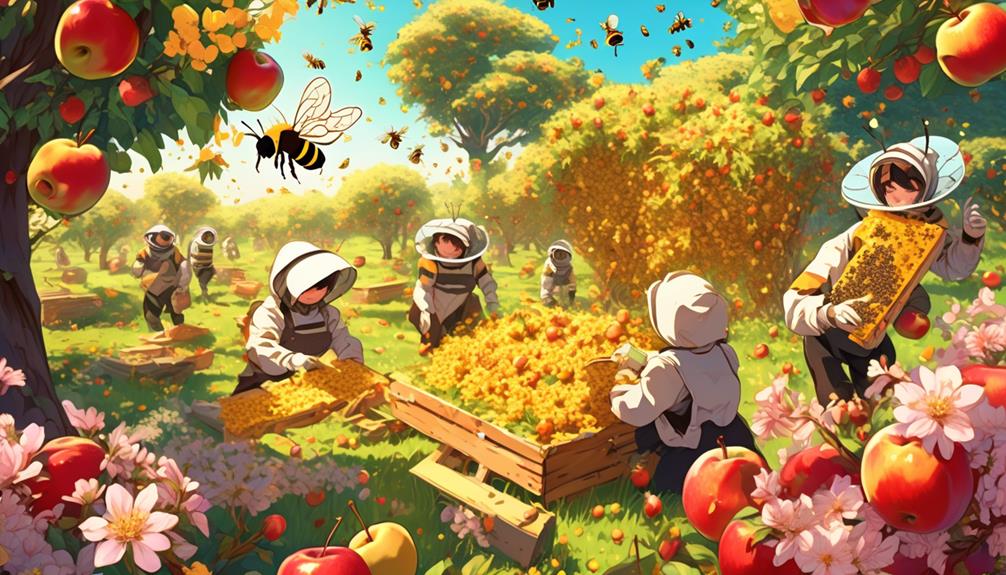
To safeguard our vital pollinators in apple orchards, it's essential to implement strategies that promote bee health and wellbeing. One practical approach is to limit the use of pesticides, particularly those known to be harmful to bees. The timing of pesticide application is also crucial – avoid spraying when bees are actively foraging, typically during the day.
Consider integrating a variety of flowering plants into your orchard. These provide bees with a diverse diet, boosting their immunity to diseases. Planting wildflowers on the orchard's periphery can also serve as a buffer zone, reducing bees' exposure to pesticides.
Another strategy is fostering natural enemies of pests, such as birds or other insects. This reduces reliance on chemical pest control, indirectly benefiting bee health.
Additionally, provide fresh water sources for bees – they need it for cooling hives, diluting stored honey, and digestion.
Frequently Asked Questions
How Do Bees Consume Apples, Do They Eat the Fruit or Just Extract the Nectar?
When you observe bees around apples, they're not actually eating the fruit. Instead, they're extracting the nectar from the apple blossoms. So, while they're attracted to apples, it's not the fruit they're after.
They also collect pollen from the blossoms, which is essential for honey production and hive health. So, in essence, they don't eat the apple itself, they just take advantage of the nectar and pollen the apple tree provides.
Are There Any Specific Types of Bees That Are More Attracted to Apple Trees?
Yes, certain bees are more attracted to apple trees. Honeybees are the main pollinators of apple trees due to their large populations and their ability to fly in cooler temperatures.
Mason bees also show a strong affinity for apple blossoms. They're more efficient pollinators than honeybees, so even a small number can significantly boost apple production.
Can the Consumption of Apples Have Any Negative Effects on Bees?
Yes, bees can consume parts of an apple, particularly the sugary juice. However, if the apple is treated with pesticides, it can have negative effects on bees, potentially causing harm or even death.
How Does the Presence of Bees Affect the Overall Health and Growth of Apple Trees?
You're right to consider bees' impact on apple trees. Bees play a crucial role in pollination, which directly affects the trees' health and productivity.
When bees visit apple blossoms, they transfer pollen, facilitating fertilization. This results in a higher yield of healthier apples. So, your apple trees aren't just feeding bees, they're benefiting from their presence too!
Without bees, your harvest could be significantly reduced.
Can Human Consumption of Apples That Have Been Pollinated by Bees Have Any Health Implications?
You're asking if eating apples pollinated by bees can impact your health. There's no evidence to suggest any negative effects.
In fact, bees pollinating apple trees contribute to a healthier, larger, and more flavorful apple crop. They're essential for biodiversity and food production.
Conclusion
So, can bees eat apples? Absolutely, they relish the sweet nectar and pollen they provide. However, they face threats in apple orchards, like pesticides.
Yet, their work in pollination is vital for apple growth. It's a beautiful symbiosis, one that needs protection.
By promoting bee-friendly practices in orchards, we can ensure bees continue to thrive and our apple harvests remain bountiful. Remember, a healthy bee population contributes to a healthier ecosystem overall.

